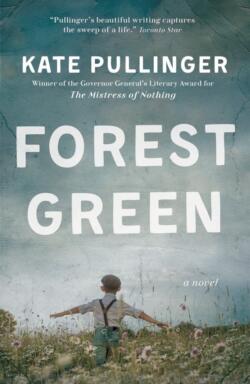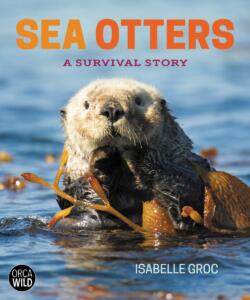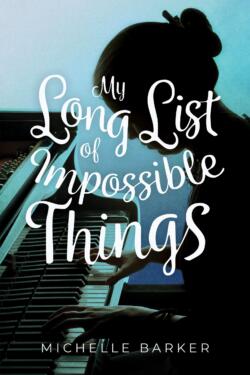Val's Book Reviews

Trauma, work, love
Forest Green
by Kate Pullinger
Toronto: Penguin Random House Canada (Anchor Canada), 2020
$19.95 / 9780385683067
Reviewed by Valerie Green

In her novel Forest Green, author Kate Pullinger has produced a powerful portrayal of a man at various stages of his life from childhood to old age.
Her protagonist, Arthur Lunn, is a man tortured by his memories. His story will pull at your heartstrings as he journeys through life, always trying to escape from the past — and from himself. The author successfully manages to illustrate this in many different episodes during his life.
Art grows up in the Okanagan Valley during the depression years in what seems an innocent and idyllic family life, but after he experiences a traumatic event that he believes he is responsible for, things are never quite the same again for him. The ensuing battle this event causes between the town and the vagrants and hobos passing through the area, causes Art to feel responsible for what he saw and what he did. The memory of that event haunts him for the rest of his life.

The memories continue as Art grows older and experiences sorrow as a soldier in the Second World War. As the years go by, he finds himself unable to settle in one place for long or stay in a relationship with the one woman he truly loves. To escape from himself, he lives for months at a time in logging camps and becomes an expert at working as a rigger, but his wandering life from one camp to another throughout British Columbia is shattered by recklessly spending everything he earns and losing himself in a blur of alcohol.
Kate Pullinger has created a character you will love, pity and be angry at but at the same time will want to save. I guarantee you will feel empathy for Arthur Lunn and by the time he becomes an old, destitute man on the streets of Vancouver, you will be moved to tears by his heartrending journey through life.
Pullinger’s descriptions of British Columbia’s landscape also deserve high praise. They adequately express Art’s love of the wilderness with sentences like:
Even at this time of year when the earth was winter-scorched brown and the orchards bare, the valley was still beautiful. The land here was sweeter. The slopes to the lake softer.
And:
The trees on the island were enormous and grew so quickly you could practically hear them.
And:

Art loved being a rigger…. he loved being up in the trees high above everyone and everything … from the top he’d settle back for a minute of two and survey the view down the mountainside, the river far below. He loved the rough feel of bark, the raw smell of pitch, the dirty glory of the trees themselves.
The one and only resilient and guiding force in Art’s life is his older sister Peg and the examination of their sibling relationship through the stages of their lives is portrayed by Pullinger in a very formidable way. Peg was Art’s mentor and his leader but also his competitor and always his saviour.
This is a powerful story of utter despair as you follow Art Lunn through those various stages of his tormented life. Nonetheless, Forest Green will leave you with a message of hope. Art might never be the man he could have become, but as he approaches eighty he has come to accept the cards life dealt to him — and that has become enough. The green forest had given him enough joy to deal with everything.
Born in Cranbook in 1961, Kate Pullinger grew up on Vancouver Island and her deep roots in the province are apparent. In 2009 her novel The Mistress of Nothing won the Governor General’s Literary Award for fiction. She has written many other stories and is currently Professor of Creative Writing and Digital Media at Bath Spa University in England.
Forest Green is her tenth novel.

“The Ormsby Review, named for pioneering historian and UBC professor Margaret Ormsby, is a remarkable and comprehensive online review of more British Columbia books than you ever imagined existing — the west coast publishing market is lively. It covers fiction, poetry, politics, memoir and much else, as well as a lot of local and west coast history.” – Christopher Moore, September 14, 2020.
Editor and Publisher: Richard Mackie
Mission Statement: The British Columbia Review, formerly The Ormsby Review, is a lively and inclusive Vancouver-based online journal devoted to the literature, arts, culture, and society of British Columbia. Our mandate is to review books by BC-based writers wherever they choose to publish them. We review books from the member publishers of the ABPBC (Association of Book Publishers of BC), but we also review books that are privately printed, self-published, or published by BC writers at publishing houses elsewhere in Canada or abroad. When possible, we also find BC reviewers. Our accessible and authoritative reviews and essays, written by experts in their fields, are packaged as illustrated magazine articles.
The British Columbia Review works with writers, publishers, and literary professionals across Canada to promote books published by BC writers or about British Columbia in all its diversity. We include books by all authors, regardless of race, age, ability, sexual orientation, gender or gender identity, ethnicity, religion, political belief, marital or family status, and/or status as Indigenous, Métis, or Inuit.
The editorial offices of The British Columbia Review are located near Commercial Drive in East Vancouver, in the traditional, unceded, and sometimes overlapping territories of the Musqueam, Squamish, and Tsleil-Wauuth peoples. Indigenous British Columbia, the land on which we live and create, extends over a large area comprising three culture areas, eight language families, and 32 distinct languages. We endeavour to review all books by and about Indigenous BC. Those reviews can be accessed directly here.


